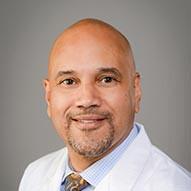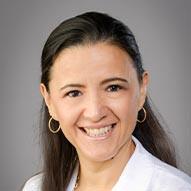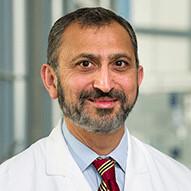Pediatric rectal suction biopsy
What is a pediatric rectal suction biopsy?
A rectal suction biopsy is a test done for children with severe or long term constipation (difficulty passing stools).
What are the side effects of a pediatric rectal suction biopsy?
A small amount of bleeding maybe seen after the biopsy.
What can I expect with a pediatric rectal suction biopsy?
A special instrument is placed in the child’s rectum by the doctor to obtain pieces of the lining of the rectum for inspection. Two good specimens are needed for the study. Sometimes it takes more than two times to get enough samples. This is a short test, lasting 5-10 minutes, causing very little discomfort.
The test allows the doctor to take a small sample of tissue (biopsy) from the rectum (the last part of the large intestine). The pathologist will then check to see if there are nerve (ganglion) cells in the sample. Results are usually available in about a week. If the biopsy shows that there are no nerve cells this mean that your child probably has a condition called Hirschsprung's disease.
What can I expect after a pediatric rectal suction biopsy?
You may see some blood after the procedure and with the first bowel movement. Call the physician if you see blood clots, blood that is greater than the amount of one teaspoon at a time, or ongoing bleeding.
How do I prepare my child for a pediatric rectal suction biopsy?
No preparation is required unless your child is a toddler or older, then an enema may be ordered before the test.
Please bring an extra diaper for babies and toddlers.
Please do not use any diaper cream, like Desitin® or A & D® ointment, on your child’s bottom before the test. If needed, you can apply it when the test is finished.
Pediatric rectal suction biopsy doctors and providers
 Bradley Barth, MDPediatric Gastroenterologist
Bradley Barth, MDPediatric Gastroenterologist Michele Alkalay, MDPediatric Gastroenterologist
Michele Alkalay, MDPediatric Gastroenterologist Amal Aqul, MDPediatric Hepatologist
Amal Aqul, MDPediatric Hepatologist Sarah Barlow, MDPediatric Gastroenterologist
Sarah Barlow, MDPediatric Gastroenterologist Nandini Channabasappa, MDPediatric Gastroenterologist
Nandini Channabasappa, MDPediatric Gastroenterologist Aakash Goyal, MDPediatric Gastroenterologist
Aakash Goyal, MDPediatric Gastroenterologist Bhaskar Gurram, MDPediatric Gastroenterologist
Bhaskar Gurram, MDPediatric Gastroenterologist Lauren Lazar, MDPediatric Gastroenterologist
Lauren Lazar, MDPediatric Gastroenterologist Charina Ramirez, MDPediatric Gastroenterologist
Charina Ramirez, MDPediatric Gastroenterologist Norberto Rodriguez-Baez, MDPediatric Hepatologist
Norberto Rodriguez-Baez, MDPediatric Hepatologist Isabel Rojas Santamaria, MDPediatric Gastroenterologist
Isabel Rojas Santamaria, MDPediatric Gastroenterologist Rinarani Sanghavi, MDPediatric Gastroenterologist
Rinarani Sanghavi, MDPediatric Gastroenterologist Meghana Sathe, MDPediatric Gastroenterologist
Meghana Sathe, MDPediatric Gastroenterologist Mhammad Gaith Semrin, MDPediatric Gastroenterologist
Mhammad Gaith Semrin, MDPediatric Gastroenterologist Luis Sifuentes-Dominguez, MDPediatric Gastroenterologist
Luis Sifuentes-Dominguez, MDPediatric Gastroenterologist David Troendle, MDPediatric Gastroenterologist
David Troendle, MDPediatric Gastroenterologist Phuong Luu, PA-CPhysician Assistant - Gastroenterology
Phuong Luu, PA-CPhysician Assistant - Gastroenterology Van Nguyen, APRN, PNP-PCNurse Practitioner - Gastroenterology
Van Nguyen, APRN, PNP-PCNurse Practitioner - Gastroenterology Jennifer Peacock, APRN, PNP-PCNurse Practitioner - Gastroenterology
Jennifer Peacock, APRN, PNP-PCNurse Practitioner - Gastroenterology Shabina Walji-Virani, APRN, PNP-PCNurse Practitioner - Gastroenterology
Shabina Walji-Virani, APRN, PNP-PCNurse Practitioner - Gastroenterology Dai Chung, MDPediatric Surgeon
Dai Chung, MDPediatric Surgeon Adam Alder, MDPediatric Surgeon
Adam Alder, MDPediatric Surgeon Nathalie Brewer, MDPediatric Surgeon
Nathalie Brewer, MDPediatric Surgeon Natasha Corbitt, MDPediatric Surgeon
Natasha Corbitt, MDPediatric Surgeon Diana Diesen, MDPediatric Surgeon
Diana Diesen, MDPediatric Surgeon Barbara Gaines, MDPediatric Surgeon
Barbara Gaines, MDPediatric Surgeon Lauren Gillory, MDPediatric Surgeon
Lauren Gillory, MDPediatric Surgeon Russell Hawkins, MDPediatric Surgeon
Russell Hawkins, MDPediatric Surgeon Charles Hong, MDPediatric Surgeon
Charles Hong, MDPediatric Surgeon Stephen Megison, MDPediatric Surgeon
Stephen Megison, MDPediatric Surgeon Carrie Moore, MDPediatric Surgeon
Carrie Moore, MDPediatric Surgeon Joseph Murphy, MDPediatric Surgeon
Joseph Murphy, MDPediatric Surgeon Samir Pandya, MDPediatric Surgeon
Samir Pandya, MDPediatric Surgeon Laura Purcell, MDPediatric Surgeon
Laura Purcell, MDPediatric Surgeon Faisal Qureshi, MDPediatric Surgeon
Faisal Qureshi, MDPediatric Surgeon Sharon Kluger, APRN, PNP-AC/PCNurse Practitioner - Pediatric Surgery
Sharon Kluger, APRN, PNP-AC/PCNurse Practitioner - Pediatric Surgery